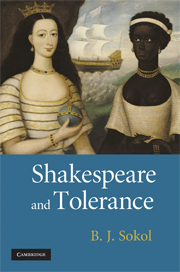Book contents
- Frontmatter
- Contents
- List of abbreviated titles
- Introduction
- 1 Shakespeare, jokes, humour, and tolerance
- 2 Shakespeare, gender, and tolerance
- 3 Shakespeare, tolerance, and nationality
- 4 Shakespeare, tolerance, and religion
- 5 ‘Race’, part one
- 6 ‘Race’, part two: Shakespeare and slavery
- 7 Afterword: tolerance as a species of love
- Notes
- Bibliography
- Index
5 - ‘Race’, part one
Published online by Cambridge University Press: 20 August 2009
- Frontmatter
- Contents
- List of abbreviated titles
- Introduction
- 1 Shakespeare, jokes, humour, and tolerance
- 2 Shakespeare, gender, and tolerance
- 3 Shakespeare, tolerance, and nationality
- 4 Shakespeare, tolerance, and religion
- 5 ‘Race’, part one
- 6 ‘Race’, part two: Shakespeare and slavery
- 7 Afterword: tolerance as a species of love
- Notes
- Bibliography
- Index
Summary
The failure to allow for changes in the sense in which the word race has been used has important consequences, for those who misunderstand the past of their society are likely to misunderstand the present, because people judge the present in the light of what they believe the past to have been.
PROSPECTUS
The following discussion of Shakespeare, tolerance, and what we now call ‘race’ will be divided between this chapter and the next. This one will concentrate on love and desire (including ‘miscegenation’), while the next will be concerned with international topics like slavery and New World encounters. The present chapter will consider Othello, for example, as a play in which bigotry begets bigotry, that is, antipathy to a ‘black’ Moorish man leads to the evil stereotyping of a ‘white’ Venetian woman. The following chapter will analyse images of slavery in Othello and elsewhere, and will focus particularly on Prospero's two exotic servants in The Tempest.
‘RACE’ IN SHAKESPEARE'S TIME
Throughout its (sadly continuing) life the spurious notion of there being a small handful of colour-coded, distinct human ‘races’ has always been both equivocal and historically unstable. This complicates current perplexities, and perhaps some confusion, over whether questions of ‘race’ are anachronistic in, or properly relevant to, discussions of Shakespeare's writing. I am sorry to enter a dermatological prior to a dramaturgical nexus, yet some questioning of ‘race’ itself must preface a questioning of race in relation to Shakespeare.
- Type
- Chapter
- Information
- Shakespeare and Tolerance , pp. 113 - 141Publisher: Cambridge University PressPrint publication year: 2008



